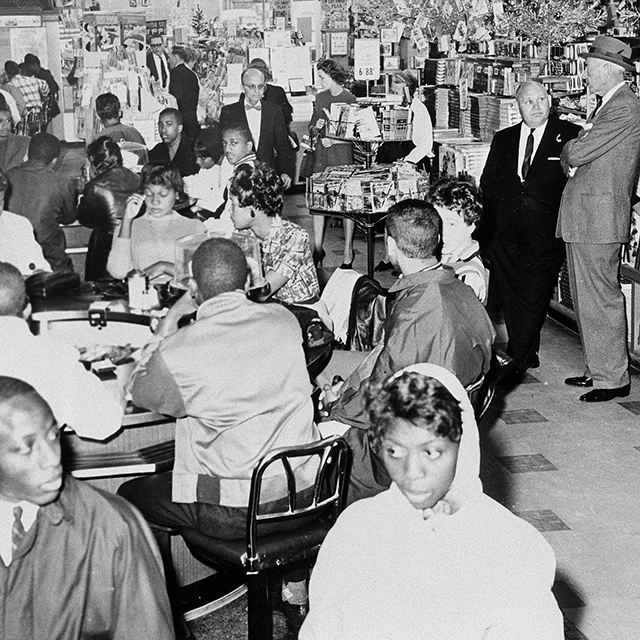1960 – Sit Ins
 African Americans take seats in the “white only” section of a Woolworth’s in Atlanta for the second straight day, Oct. 20, 1960, during a sit-in demonstration. The counter was closed as soon as the demonstration began. W.O. McClain, manager of the Woolworth store, second from right, talks to a spectator. (AP Photo/Horace Cort) |
Southern cities maintain segregated public facilities including movie theaters, hotels, and lunch counters in downtown stores. In Greensboro, North Carolina, four black college students stage the first sit-in at a white lunch counter.
Activist Jim Lawson holds workshops in non-violent protest at Nashville’s Fisk University. He attracts people like college student Diane Nash and seminarians John Lewis and C. T. Vivian, and teaches non-violent direct action tactics adopted from Indian leader Mahatma Gandhi, including peaceful resistance. The protesters, dressed in their best clothes, target Nashville’s lunch counters, where they sit and wait to be served. The stores respond by closing the counters, but the students continue to sit, quietly doing homework. After several weeks, their protest attracts gangs of white toughs, and police who arrest the activists for disorderly conduct. More students sit to take their places, filling the jails and refusing to pay fines. When punched or assaulted by segregationists, the protesters do not retaliate, but simply protect themselves and each other. The sit-in movement spreads to 69 cities across the South, black communities organize economic boycotts, and sympathetic Northerners picket local branches of the department stores. In Nashville, a climate of fear culminates in a bombing that destroys the house of Alexander Looby, a black lawyer who has been working with the activists. Thousands march to City Hall and confront Mayor Ben West. After the mayor concedes that the lunch counter segregation is wrong, businesses quickly desegregate. Elated with their success, students found the Student Nonviolent Coordinating Committee, or SNCC. |
Project “C” in Birmingham | The March on Washington | Freedom Summer | The Civil Rights Act | March from Selma to Montgomery
Malcolm X and the Rise of Black Power | The Voting Rights Act | Poor People’s Campaign | King Assassination
Much of this text is excerpted, with permission, from the website for the American Experience series Eyes on the Prize. Read more about these events and others on that site.

